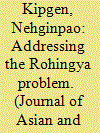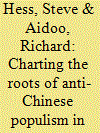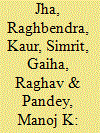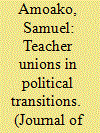| Srl | Item |
| 1 |
ID:
131247


|
|
|
|
|
| Publication |
2014.
|
| Summary/Abstract |
The simmering tension between Rakhine Buddhists and Rohingya Muslims in Western Myanmar escalated into a violent conflict in 2012, first in June and again in October. The violence led to the loss of over a hundred lives, destruction of thousands of homes, and the displacement of tens of thousands of people. The Myanmar government intervened to end the bloodshed but tension continues to linger. This article argues that, instead of alienating the Rohingyas politically, consociational democracy should be pursued to address the problem. The support and cooperation of both Buddhists and Muslims, and perhaps assistance from a neutral organization like the United Nations, would help achieve a political solution.
|
|
|
|
|
|
|
|
|
|
|
|
|
|
|
|
| 2 |
ID:
131242


|
|
|
|
|
| Publication |
2014.
|
| Summary/Abstract |
In this article the authors conduct focused case studies on Zambia and Ghana to investigate the increasingly diverse popular reactions to Chinese engagement throughout the region of sub-Saharan Africa. In this effort they challenge the existing binary exploitation/opportunity paradigm through which growing Chinese engagement in sub-Saharan Africa is often analyzed. Instead, they propose an alternative framework, which centers less on the positive or nefarious nature of Chinese involvement and more on the institutional structures of African regimes. As opposed to closed autocracies and consolidated multiparty democracies, fluid transitional states create opportunities for the appearance of anti-Chinese populist movements akin to Michael Sata and the Patriotic Front in Zambia.
|
|
|
|
|
|
|
|
|
|
|
|
|
|
|
|
| 3 |
ID:
131245


|
|
|
|
|
| Publication |
2014.
|
| Summary/Abstract |
The literature on corruption is extensive as the topic is multifaceted, testifying to the intractable and stubborn nature of a problem that societies have been struggling to tackle with for centuries. Lack of improvement in eradicating corruption is the result of misguided and misplaced strategies based on weak analytical underpinnings and still weaker appreciation of the institutional milieu of individual countries. This paper attempts to introduce and unpack key concepts associated with the idea of corruption. The paper attempts to punctuate that corruption needs analysis as an indicator of 'failed governance'. It presents empirical substantiation from various studies undertaken and offers a comprehensive study of the extent and effect of corruption on the Indian economy and the perception of a cross-section of people on various facets and the impact of corruption on diverse sectors.
|
|
|
|
|
|
|
|
|
|
|
|
|
|
|
|
| 4 |
ID:
131244


|
|
|
|
|
| Publication |
2014.
|
| Summary/Abstract |
The workfare scheme, the National Rural Employment Guarantee Scheme (NREGS), and the direct food subsidy programme, the Targeted Public Distribution Scheme (TPDS), represent two social safety nets instituted in India as anti-poverty measures. This paper examines whether from the point of view of individual households the two programmes are substitutes or complements, as this will shed light on the appropriateness of the design of the two programmes. Based on primary household data collected for the Indian states of Rajasthan and Madhya Pradesh (MP), we show that, in Rajasthan, a large percentage of households consider TPDS and NREGS programmes to be substitutes for each other, while in MP the households often perceive the two programmes as complements. Thus it appears that the two programmes are better designed in MP since an incentive for participation in one programme has desirable side effects on participation in the other. Correlates of participation in the two states are identified and the paper advances several policy conclusions.
|
|
|
|
|
|
|
|
|
|
|
|
|
|
|
|
| 5 |
ID:
131246


|
|
|
|
|
| Publication |
2014.
|
| Summary/Abstract |
The Self-Help Group-Bank Linkage Programme (SHG-BLP) was designed with the objective of bridging the prevailing gap in the financial network and spreading banking facilities to the poor in rural and urban areas. This paper examines the progress of SHG-BLP over the last two decades in terms of: (a) the outreach of SHG-BLP; (b) spatial disparity in SHG-BLP; (c) SHG spread with respect to banking and socio-economic indicators; and (d) potential vis-à-vis achievement under the programme in terms of coverage of rural poor population.
|
|
|
|
|
|
|
|
|
|
|
|
|
|
|
|
| 6 |
ID:
131243


|
|
|
|
|
| Publication |
2014.
|
| Summary/Abstract |
The negotiation to end apartheid - which was initiated in secret in the 1980s - solidified in the 1990s when FW de Klerk unbanned the African National Congress (ANC), South African Communist Party (SACP), Pan African Congress (PAC) and other political and social movements, as well as struggle icons, prominent among whom was Mandela. The South African Democratic Teachers' Union (SADTU) emerged within the euphoria surrounding Mandela's release and the negotiations to end apartheid. SADTU combined its educational struggles with the political struggle to end apartheid rule. Drawing on documentary (mainly archival), newspaper reports and oral evidence, this article examines SADTU's struggles for recognition, its resistance against education restructuring, and its defiance campaign against inspection from 1990-1993. I suggest that SADTU's contentions during the period were rooted in the political struggle to end apartheid rule since it regarded the apartheid education departments as illegitimate structures needing to be dismantled. In addition, the socio-economic undercurrents that characterized the transition were carried into education restructuring and thus pushed SADTU into militancy.
|
|
|
|
|
|
|
|
|
|
|
|
|
|
|
|